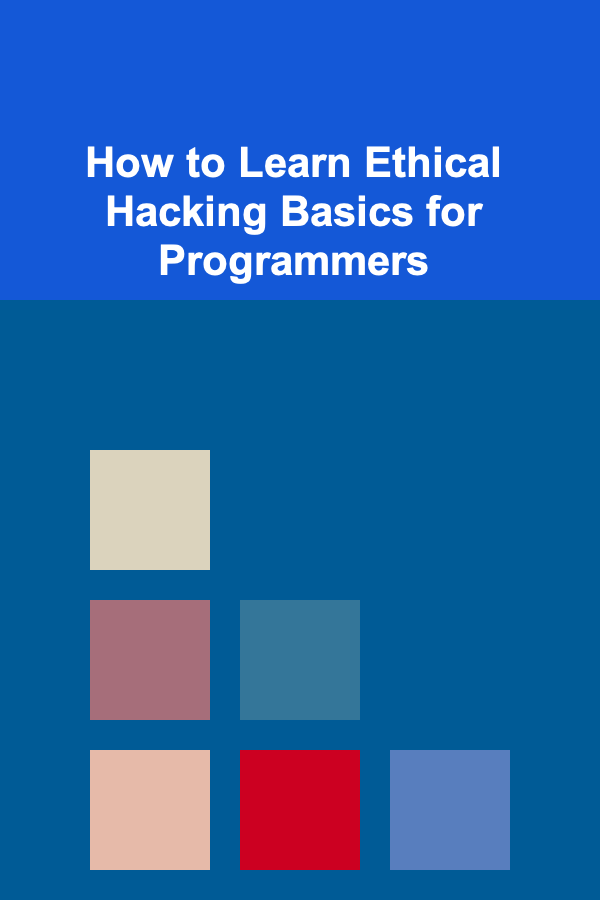
How to Learn Ethical Hacking Basics for Programmers
ebook include PDF & Audio bundle (Micro Guide)
$12.99$6.99
Limited Time Offer! Order within the next:

Ethical hacking is an essential skill for any programmer interested in cybersecurity. It involves understanding the techniques and strategies used by malicious hackers, but rather than exploiting them, ethical hackers use this knowledge to help organizations protect their data and systems. As a programmer, gaining knowledge in ethical hacking can significantly boost your skills and career opportunities. But where do you start? In this comprehensive guide, we will dive into how you, as a programmer, can learn the basics of ethical hacking.
Understanding Ethical Hacking
Before diving into the nuts and bolts of ethical hacking, it's important to understand what it really entails. Ethical hacking, also referred to as penetration testing or white-hat hacking, is the practice of probing computer systems, networks, and applications for vulnerabilities that could be exploited by cybercriminals. The key difference between ethical hackers and black-hat hackers (malicious hackers) is that ethical hackers have permission to perform these tests.
Ethical hacking allows companies to identify security weaknesses before a malicious hacker does. The primary goal is to ensure that systems and data remain secure.
Why is Ethical Hacking Important for Programmers?
For a programmer, understanding the principles of ethical hacking is incredibly valuable. Here's why:
- Security Awareness: As a developer, understanding common vulnerabilities helps you write secure code and prevents your applications from being exploited.
- Job Opportunities: Many organizations require programmers with knowledge of cybersecurity practices. Ethical hackers are in demand across industries.
- Building Secure Software: Knowing how attackers think and operate helps you design software with security in mind from the start.
Prerequisites for Learning Ethical Hacking
2.1 Knowledge of Programming
Since you're already a programmer, you have a strong foundation to build upon. Ethical hacking often requires knowledge of programming languages that can help you test vulnerabilities, exploit weaknesses, or create custom hacking tools. The most common programming languages useful for ethical hackers are:
- Python: Widely used in ethical hacking for scripting and automation.
- JavaScript: Crucial for understanding web security, especially vulnerabilities like Cross-Site Scripting (XSS).
- C/C++: Knowing C and C++ can help you understand how vulnerabilities like buffer overflows work.
- PHP: Many websites are built with PHP, so it's essential to know how to secure or exploit them.
Having a good grasp of these languages will make ethical hacking much easier to understand.
2.2 Understanding Computer Networks
Knowledge of networking fundamentals is essential for ethical hacking. Hackers often exploit weaknesses in network protocols and services to gain unauthorized access to systems. Understanding how data moves across networks, how networks are structured, and the various protocols used (e.g., TCP/IP, DNS, HTTP) is crucial.
The following topics are important to study:
- IP Addresses and Subnetting: Know how devices are addressed and how subnetting works.
- Protocols and Ports: Learn about common protocols like HTTP, FTP, SSH, and others.
- Firewalls and Routers: Understand how firewalls, routers, and other network devices work and how they are used to secure or breach networks.
2.3 Understanding Operating Systems
Most ethical hacking involves interacting with computer systems, and knowing how different operating systems work is key. Many hacking tools are designed for Linux, so it's essential to become proficient in using Linux-based systems.
- Linux: Learn the Linux command line, which is the most common environment for hacking tools.
- Windows: Many attacks target Windows-based systems, so it's useful to understand how to secure and exploit these systems.
Familiarity with both operating systems will enable you to understand the security vulnerabilities unique to each.
Learning Ethical Hacking Tools and Techniques
Now that you have the foundational knowledge in programming, networking, and operating systems, it's time to explore the tools and techniques used in ethical hacking. Ethical hackers use a variety of tools to identify vulnerabilities and test systems, and as a programmer, you'll need to understand how these tools work and how they can be applied to your security testing efforts.
3.1 Penetration Testing Tools
Penetration testing involves simulating an attack on a network or system to identify security flaws. Ethical hackers use a variety of tools for this task, and understanding how to use these tools will help you as a programmer to evaluate the security of your code.
Some of the essential penetration testing tools include:
- Kali Linux: A popular Linux distribution used for penetration testing that includes a wide array of hacking tools.
- Metasploit: A framework for developing and executing exploit code against a target.
- Nmap: A network scanner used to discover devices and services on a network.
- Burp Suite: A tool used for web application security testing, helping identify vulnerabilities like SQL injection or XSS.
3.2 Vulnerability Scanning and Exploitation
To be an effective ethical hacker, you need to understand how to scan for and exploit vulnerabilities. Many vulnerabilities can be identified with automated tools that scan for common issues in code or system configurations.
Some common vulnerabilities to be aware of are:
- SQL Injection: When attackers manipulate a web application's database by inserting malicious SQL queries.
- Cross-Site Scripting (XSS): Where attackers inject malicious scripts into a web page that are executed by other users.
- Buffer Overflow: A vulnerability in which a program writes more data to a buffer than it can hold, allowing attackers to overwrite adjacent memory.
You can use tools like Metasploit and Burp Suite to exploit these vulnerabilities and learn how to protect against them in your code.
3.3 Web Application Security
Web applications are one of the most common targets for attackers, so learning how to secure web applications is critical for any programmer interested in ethical hacking.
The key web application security concepts include:
- OWASP Top 10: The Open Web Application Security Project (OWASP) maintains a list of the top 10 most critical web application security risks. These include issues like injection attacks, broken authentication, and insecure direct object references.
- Session Management: Ensuring that user sessions are securely managed to prevent attacks like session hijacking.
- Data Encryption: Encrypting sensitive data to protect it from interception and exploitation.
3.4 Social Engineering
While most ethical hacking is focused on technical vulnerabilities, it's also crucial to understand social engineering attacks. These attacks exploit human psychology to gain unauthorized access.
Social engineering can include:
- Phishing: Trick users into revealing personal information via fake websites or emails.
- Pretexting: Creating a fabricated scenario to convince the target to provide sensitive information.
- Baiting: Enticing the victim to download malicious files by promising rewards.
Understanding these methods will help you recognize social engineering attempts and defend against them in the software you develop.
Developing Ethical Hacking Skills Practically
Learning ethical hacking is not a purely theoretical pursuit. To truly master it, you need to practice. Fortunately, there are many ways to do so without breaking the law.
4.1 Setting Up a Lab
Setting up your own hacking lab is a great way to practice your skills without causing harm. Here's what you need to get started:
- Virtual Machines (VMs): Use virtual machines to create isolated environments where you can safely test exploits.
- Vulnerable Applications: There are intentionally vulnerable applications like DVWA (Damn Vulnerable Web Application) or Hack The Box that allow you to practice ethical hacking techniques in a safe and controlled environment.
- Networking Lab: Set up a test network with different devices and configurations to simulate real-world attack scenarios.
4.2 Capture the Flag (CTF) Competitions
CTF competitions are a great way to hone your skills while having fun. These competitions involve solving security-related challenges, such as exploiting vulnerabilities, cracking passwords, and gaining access to restricted areas. Platforms like CTF365 and TryHackMe offer a variety of CTF challenges for all skill levels.
4.3 Participate in Bug Bounty Programs
Many companies offer bug bounty programs where they pay ethical hackers to find vulnerabilities in their systems. Participating in these programs can provide real-world experience and help you improve your skills. Some of the well-known bug bounty platforms include:
- HackerOne
- Bugcrowd
- Synack
Resources for Learning Ethical Hacking
There are numerous resources available to help you learn ethical hacking. Below are some excellent resources to guide you on your learning journey:
5.1 Online Courses
- Udemy: Offers a range of courses on ethical hacking and penetration testing, including courses that focus on using specific tools like Kali Linux and Metasploit.
- Coursera: Provides more structured learning paths, including university-level courses on cybersecurity and ethical hacking.
- Cybrary: Focuses on cybersecurity training with a range of beginner to advanced courses.
5.2 Books
- "The Web Application Hacker's Handbook" by Dafydd Stuttard and Marcus Pinto -- A comprehensive guide to web application security.
- "Hacking: The Art of Exploitation" by Jon Erickson -- A deep dive into the concepts and techniques of hacking and exploitation.
- "The Basics of Hacking and Penetration Testing" by Patrick Engebretson -- An excellent beginner's guide to ethical hacking.
5.3 Online Communities
- Reddit (r/netsec): A large community where security enthusiasts share tips, resources, and discussions.
- Stack Exchange (Information Security): A great place to ask questions and learn from experts.
- SecurityTube: Offers videos on a wide variety of ethical hacking topics.
Conclusion
Ethical hacking is a valuable skill for any programmer looking to enhance their cybersecurity knowledge. It involves learning the principles of security, understanding how hackers exploit vulnerabilities, and using that knowledge to protect systems and data. By building on your existing programming knowledge, learning about networks, operating systems, and various hacking tools, and practicing in safe environments, you can develop the skills necessary to become a successful ethical hacker. Embrace the challenge, stay ethical, and continue learning to stay ahead in the ever-evolving world of cybersecurity.

How to Avoid Common Budgeting Mistakes When Renovating
Read More
How to Create a Magical Christmas Tree Display
Read More
How to DIY Holiday Garlands and Banners for a Festive Touch
Read More
The Future of Passive Income in Deep Learning and AI
Read More
How to Master Stunt Kiting
Read More
How to Master Soufflés and Meringues
Read MoreOther Products

How to Avoid Common Budgeting Mistakes When Renovating
Read More
How to Create a Magical Christmas Tree Display
Read More
How to DIY Holiday Garlands and Banners for a Festive Touch
Read More
The Future of Passive Income in Deep Learning and AI
Read More
How to Master Stunt Kiting
Read More